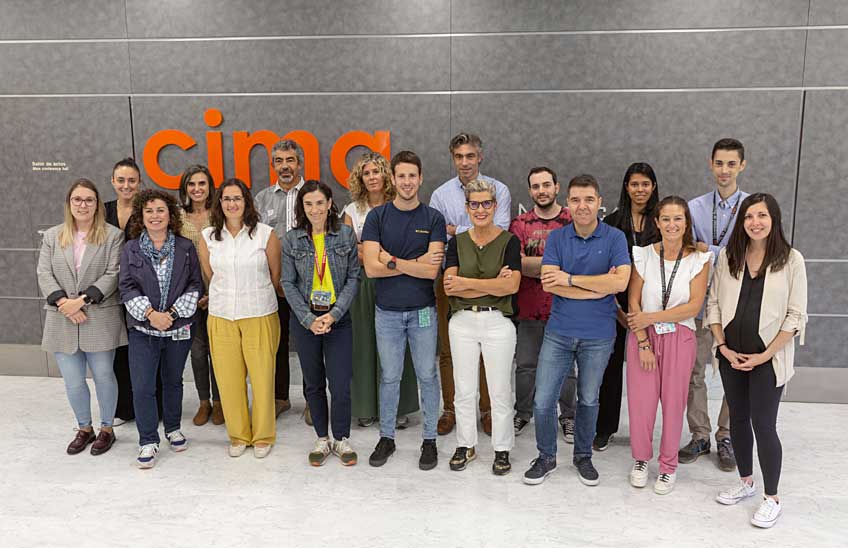Blocking an immune molecule shrinks tumor and prolongs survival in animal models of the most aggressive childhood cancer
Researchers from Cima and Clínica Universidad de Navarra, together with the international cooperative group Diffuse Midline Glioma (DMG-ACT), demonstrate that TIM-3 inhibition promotes immune report of diffuse intrinsic stem glioma (DIPG).

FotoManuelCastells/Iker Ausejo-Mauleon and Marta Alonso (in the center) together with the professionals of Cima and Clínica Universidad de Navarra who have participated in the work
05 | 10 | 2023
Researchers from the Cima and the Clínica Universidad de Navarratogether with the international cooperative group Diffuse Midline Glioma (DMG-ACT), have confirmed that blockade of an immune checkpoint molecule reduces tumor shrinkage and prolongs survival in animal models of the most aggressive childhood cancer. This research, framed in the Cancer Center Clínica Universidad de Navarra, demonstrates that inhibition of TIM-3 favors the immune report of diffuse intrinsic stem glioma (DIPG) and improves the prognosis of the disease.
DIPG is an aggressive brain stem tumor and the leading cause of death related to pediatric cancer. Due to its location therapeutic options are limited, so it is essential to study effective treatments. "In recent years, immunotherapy has proven to be an alternative for many types of cancer. In particular, immune checkpoint inhibitors (regulators core topic of the immune system) have shown good results in various solid tumors. But due to the unique tumor microenvironment of DIPGs, classical inhibitors have not been effective in these pediatric patients," explains Iker Ausejo-Mauleon, researcher predoctoral fellow in the Cancer Division at Cima and first author of work.
Antitumor immune response
In recent years, the presence of the TIM-3 checkpoint in tumor cells has been linked to the proliferative and metastatic capacity of different types of cancer. "In this study, we show that TIM-3 is also highly expressed in both tumor cells and cells in the DIPG microenvironment," explains Dr. Marta Alonso, co-director of the Solid Tumor Program at Cima and director of the study. The results have been published in the latest issue of the scientific journal Cancer Cell.
The next step was to block this molecule and they found that its inhibition promotes a proinflammatory tumor microenvironment that favors a potent antitumor immune response. "As a consequence, long-term survival deadline of experimental models is increased. Therefore, TIM-3 is presented as a therapeutic target that can guide the development of clinical trials for these patients," the researchers note.
This work has been made possible thanks to funding from the European Research Council (ERC), ChadTough-Defeat DIPG Foundation, the association Española Contra el Cáncer, El sueño de Vicky, Fundación Adey, Fundación ACS and the association Pablo Ugarte, among other public and private organizations.
reference letter bibliographic
-
TIM-3 blockade in diffuse intrinsic pontine glioma models promotes tumor regression and antitumor immune memory
-
Cancer Cell: https://doi.org/10.1016/j.ccell.2023.09.001
